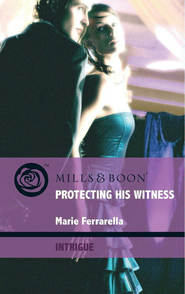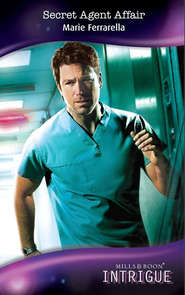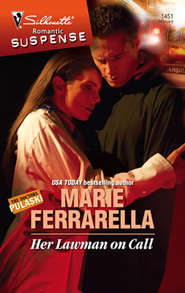По всем вопросам обращайтесь на: info@litportal.ru
(©) 2003-2024.
✖
Coming Home For Christmas
Автор
Год написания книги
2019
Настройки чтения
Размер шрифта
Высота строк
Поля
“No, I know where it is. Thanks, anyway, Mrs. Anderson.”
Peggy Anderson lingered in the doorway. “It’s just not going to be the same without your mother living next door to me,” she told him sadly. “Your mother had a way of lighting up everyone’s life the second she came in contact with them.”
“So I’ve heard,” Keith replied, an extremely tight, polite smile underscoring the words.
Observing him, Kenzie could see that he was holding himself in check. Keith was probably afraid that if he allowed his guard to go down, he’d fall apart.
Sympathy flooded through her.
It intensified as she drew closer.
Ushering Mrs. Anderson out of the house, Keith closed the door firmly behind the talkative woman. He stood there for a moment, looking at the closed door, his entire body a testimony to rigidly controlled grief.
Or so it seemed to Kenzie.
There were men who wanted only to be left alone when they were dealing with their darkest hour. However, she had never learned how to accommodate them, because everything within her cried out to offer a grieving person as much comfort as she could render.
And besides, this was Keith. There was no way she could stand on ceremony.
Coming up behind him, she placed her hand on his rigid shoulder, trying to convey her availability to comfort him in his grief. She said with a great deal of sincerity, “I’m so sorry.”
Keith almost jumped when he felt her hand on his shoulder. He’d forgotten all about her. How long had she been standing there? She was supposed to be upstairs, taking inventory, not down here, eavesdropping.
He swung around to look at her. “You can’t sell any of it?” Keith asked, assuming that her apology referred to the things she’d found in the upstairs bedrooms.
“What?” It took Kenzie a minute to untangle his reaction. And then she understood. They were talking about two entirely different things.
“Oh, no, I’m not apologizing about anything that has to do with your estate. I just wanted to tell you how very sorry I am about your loss.” And then Kenzie frowned, shaking her head. “The words are trite,” she was quick to admit, “but that doesn’t make the sentiment any less genuine.”
“I’m sure it is,” he said crisply, cutting the young woman off in case she had more to say on the subject.
This whole thing was much too private, and he didn’t want to talk about it. However, he could see that she felt she had to say something. He shrugged away any obligation she might have thought she had in this case.
“Everyone’s got to die sometime, right?” He needed to get out—and he actually did have somewhere else to be. “I have to leave for a while. Go on with your tour. Let me know if you think you can sell these things and what they might go for.”
“Absolutely,” she promised, then asked, “Where are you going?”
He wasn’t prepared to be questioned, so he didn’t have a lie on tap. Which was how the simple truth wound up coming out. “I’ve got to go see about making funeral arrangements.”
Now there was something she’d find oppressive if she had to face it on her own. “Are you going alone?”
Again, she’d caught him off guard. And there was that weird feeling again, as if he knew her from somewhere. But that wasn’t possible, was it?
Either way, Keith thought that was an odd question for her to be asking him. “Yes. Why do you ask?”
“I just thought you might want some company. You know, someone to talk to. This isn’t exactly a run-of-the-mill errand you’re about to undertake,” she pointed out.
He turned the tables on her by saying, “If you need to talk to me, we can meet later.”
With that, and a mumbled “See you later,” he walked out before Kenzie had a chance to say that she thought he was the one who needed to talk, not her.
Instead of going back to her work—she had yet to inventory the first floor—Kenzie went to the front window, moved aside the curtain and stood in silence as Keith walked down the driveway to his car.
Here was someone who was either oblivious to, or more likely in denial about, the extent of his own grief.
Watching him, Kenzie made up her mind.
* * *
There were too many damn questions to answer, Keith thought wearily half an hour later.
Mrs. Anderson had told him that, per his mother’s wishes, upon her death, Dorothy O’Connell wanted to be laid out at Morrison & Sons Funeral Home. He’d assumed from this information that all the paperwork had been taken care of.
He’d assumed wrong.
He supposed he could have just taken the easy way out, called the funeral director to ask about the costs and then assured the man that the check would be in the next day’s mail. To be honest, Keith still wasn’t entirely sure what he was doing here. It all seemed rather perverse and against what he’d always felt his role would be after his mother’s final breath had been taken.
This process wasn’t supposed to matter to him, but it did.
He supposed that somewhere—very deep inside—was still a sliver of the kid he had once been. The kid who had gotten along with his mother and had wanted nothing more than to take care of her and his sister. He’d wanted to be the man of the family.
He must have been all of ten or eleven years old at the time.
Before the age of reason, Keith silently added.
“I can write up a full accounting,” Abe Morrison Sr. was telling him.
The funeral director looked exactly the way Keith would have expected the man to look. Tall, thin, somber, with a touch of gray at his temples and a soft voice, as if he knew that speaking above a certain decibel level would be intruding on the next-of-kin’s grief.
But Keith was hardly listening to the man. He just wanted this part of it to be over with.
Hell, he wanted all of it to be over with.
More than anything, he wanted to be on a plane flying back to San Francisco and his life, his future, not sitting here with a stately old man, stuck in the past as he listened to him talk about a woman who was in essence a stranger to Keith and had been so for close to ten years.
Abe Morrison, however, seemed to know her very well. Why the thought irritated him so much, Keith wasn’t sure, but it did and that contributed to his feelings of intense restlessness.
The man’s whisper-soft voice was beginning to annoy him, as well.
“She was very explicit, your mother,” Abe was saying. “She didn’t want to burden you with a lot of details.” A mass of wrinkles around his eyes became prominent as the funeral director offered him what appeared to be a fond smile. “Not all our clients are as thoughtful as your mother was.”
Keith nodded dismissively. He didn’t want to be here in this place where the dead were made to look lifelike. He took out his checkbook, hoping that would signal an end to Morrison’s narrative.
Placing his checkbook on the edge of the man’s mahogany desk, his pen poised, Keith asked, “So, what do I owe you?”
“Nothing,” Abe replied serenely.
Keith looked up at the man. Was this some sort of a game? If it was, the point of it was lost on him. “Nothing?” he questioned.











